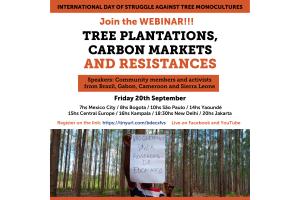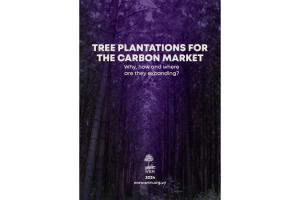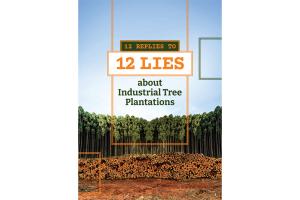The corporate lies behind the ever-increasing expansion of industrial tree plantations.
Large-Scale Tree Plantations
Industrial tree plantations are large-scale, intensively managed, even-aged monocultures, involving vast areas of fertile land under the control of plantation companies. Management of plantations involves the use of huge amounts of water as well as agrochemicals—which harm humans, and plants and animals in the plantations and surrounding areas.
Articles
13 September 2024
On the eve of the International Day of Struggle against Tree Monocultures, we invite you to participate in the webinar “Tree Plantations, Carbon Markets and Resistances”. It will be on Friday 20th September.
Publications
10 September 2024
This briefing provides an overview of the expansion of tree plantations aimed at carbon markets. Where are these plantations located, who is profiting from them, what have been the impacts for communities living on the lands these projects occupy, and what international initiatives are taking place to boost tree plantations for carbon offsetting.
Publications
21 September 2022
This publication exposes the most common misleading statements currently used by plantation companies. It’s is based on the briefing "Ten Replies to Ten Lies" written by Ricardo Carrere in 1999.
Bulletin articles
22 September 2025
FALTA EL TEXTO
Bulletin articles
22 September 2025
In 2020, WRM published an article that analyzed various actors' proposals to expand tree plantations in Africa; these actors included the African Development Bank (AfDB) and World Wildlife Fund Kenya (WWF). Five years later, with many communities on the continent continuing to resist and fight against forestry companies and their plantations, we decided to follow up on the situation. Our findings can be summarized in the following way: Monoculture tree plantation promoters, companies and financiers operate with a colonialist vision and use colonialist practices; there are new actors and sources of investment; and their actions are always based on the exploitation of peoples and territories.
Bulletin articles
22 September 2025
We are peasants from Indonesia, the world’s largest producer of palm oil. In recent decades, we have witnessed the spread of oil palm monocultures in our territory, an expansion driven by multinational companies with government support. False promises led us to accept plantation partnership schemes that put us at risk of losing our land. What was once forest and traditional crops have been replaced by monocultures that have left us with food shortages, debt, and the threat of floods. For this reason, we organized ourselves to end this exploitation and restore our traditional way of life. And here we share the story of our struggle.
Bulletin articles
22 September 2025
This is the story of how we, a group of indigenous peoples and peasants in Colombia, have come together under the name Cajibío Interethnic and Intercultural Territory of Life (TEVIIC, by its Spanish acronym), to face one of the world's largest multinational paper and cardboard manufacturers: Smurfit Westrock. Our goal is to achieve Agrarian Reform through autonomy and concrete actions.
Bulletin articles
22 September 2025
Seja no Brasil, em meio a monocultivos de eucalipto, ou na Tailândia, cercada por plantações de dendê, as mulheres estão na linha de frente da resistência a esses projetos que exploram e devastam a terra em busca de lucro. Ainda que em contextos diferentes e com particularidades culturais específicas, esses projetos ameaçam a autonomia, os corpos e a cultura dessas mulheres de forma muito parecida. E a resposta que elas dão também parte de uma base comum: a resistência baseada nos laços comunitários e nas raízes ancestrais. É isso que nos contam duas ativistas camponesas em luta pela terra, cada uma de um desses países.
Bulletin articles
22 September 2025
Two Joghban leaders who have been active in the fight against Equatorial Palm Oil's (EPO) invasion of their ancestral lands talk about their victorious resistance process. Their resistance culminated in 2018 with official state recognition of part of their territory. However, they stress that this long-term struggle is ongoing. “We are going to resist; we will always resist, because land matters to us and to our future generations”, says Isaac Banwon, one of the leaders.
Bulletin articles
22 September 2025
The article we recommend shares the story of Uma Bai Netam, a woman from the Gond tribe in India. It helps us understand how women from traditional communities are particularly affected by commercial tree monocultures – which are allegedly used to offset the destruction of forest areas caused by extractive or infrastructure projects. Uma and other Indian women have won some partial victories, such as the legal right to the land where they have lived and worked for decades.
Other information
22 September 2025
The new report from GRAIN shows how IT corporations like Meta, Microsoft and Amazon are turning to carbon markets to hide their ballooning greenhouse gas emissions, caused in large part by the industry’s push for increasing use of energy-heavy AI and cloud computing. GRAIN’s research looks at how in particular Amazon and the USD 10 billion Bezos Earth Fund set up by Amazon co-founder Jeff Bezos don’t stop at just buying carbon credits. Both are involved in creating the infrastructure to produce carbon credits.









